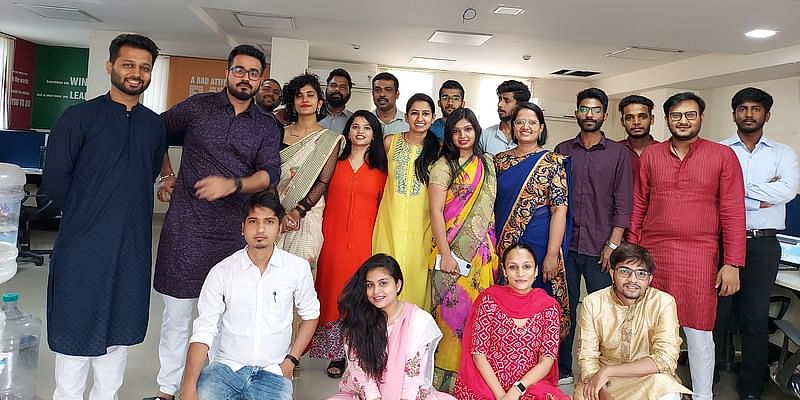When Abhra Bose lost his mother in 2017, he moved from Mumbai to his hometown, Chakdaha, a small municipal town in West Bengal. The town soon went on to become the headquarters of his startup, Food Express Online, a rural food aggregator.
Started in February 2018 by Abhra and his childhood friend Sagar Mallick, Food Express Online now delivers 2,000-2,500 meals every month, which has translated into a total revenue of Rs 50 lakh for financial year 2020-21.
Abhra says this is significant because the town, with a population of just about a lakh people, was never used to online food delivery service. In fact, people in Chakdaha did not even know about ordering food online. He claims that Food Express Online is the first-ever food delivery service provider in the town.
With a team of 15 people, the startup now aims to become a food delivery service in rural India that is on a par with global standards.
How it started?
Abhra lost his mother when he was working at Bureau Veritas in Mumbai. He says it happened suddenly and he could not be with his mother during her last moment.
“My life was changed in the blink of an eye,” says 30-year-old Abhra. He could not cope with the lonely feeling and decided to quit his job and move back to his hometown. For a couple of months, Abhra explored some side hustles with startups such as a radio platform in Bengali, hostel for students, etc., but nothing worked for him.
A turning point came when Abhra decided to start something of his own, and he spoke to his childhood friend Sagar, a techie, who had the idea of delivering food in rural and census towns. Sagar was running a computer store in the town and wanted to explore other business ideas, but could not get started. After few discussions, they decided to start Food Express Online in February 2018.
Both invested Rs 70,000 raised from family and friends to put the initial setup together. Sagar says that the company started with a call centre model where customers used to call and place the order. Later, in September 2019, it launched its own android app. The company ensures the food meets quality standards and is delivered on time to the customers.
“Initially we partnered with two street food vendors, and the town, which never heard of food delivery, surprised us with 17 delivery orders in the first month,” says 29-year-old Sagar.
Speaking of challenges, he says that it was tough in the early stage as the market was not ready and the need in rural areas was completely different compared to cities and towns. But the duo knew how to create a need in their hometown. They started digital marketing via Facebook, sent push messages via WhatsApp, created local campaigns, and got public attention by early 2019, and most importantly, hand held the restaurant partners.
Competition and business model
According to a report by Google and Boston Consulting Group (BCG), India’s online food industry will be an $8 billion market by 2022, growing at a CAGR of 25-30 percent. The market is dominated by players like Swiggy and Zomato. But Sagar says that being a rural food delivery platform, the startup is not competing with Swiggy or Zomato.
“Our aim is to provide city-like services in rural and census towns in India. The market readiness is hugely different in villages. Our vision is to focus on rural areas and minimise the difference between city and village life,” he adds.
Abhra says there is no minimum order, and as compared to other players in this space, the delivery charge as well as commission from partners are the lowest. Abhra adds that the company’s USP is that it focuses on local food and helps people to order food in their town. “We also have price manipulation and we charge the same price at what it is offered by the vendor, unlike any other app in the industry,” says Abhra.
Food Express Online charges Rs 25 for delivery from customers within 2 km and charges a commission of 5-10 percent from restaurant partners.
Pandemic, growth, and future plans
The founders share that the pandemic gave a push to Food Express Online, and many new food outlets mushroomed in the town. At present, it has more than 50 restaurant partners from across the town and saw a huge surge in food delivery during the pandemic.
The startup, which saw month-over-month growth in 2020-21, says it uses 10 percent of its revenue to expand its business operations. “Today we have 5,000 active users on our app, and we have high ratings of 4.6 stars out of 5,” says Sagar.
The startup has now expanded to five nearby towns, which are within 35 km from Chakdaha, and aims to clock revenue of Rs 2 crore by FY22. Speaking about the expansion, Abhra says they want to first have a successful model in their hometown before replicating it in other rural areas.


![[Startup Bharat] How these two friends decided to tap into the food delivery space in rural West Bengal](https://nationxnews.com/wp-content/uploads/2021/04/food-delivery-space-in-rural-West-Bengal.jpg)




